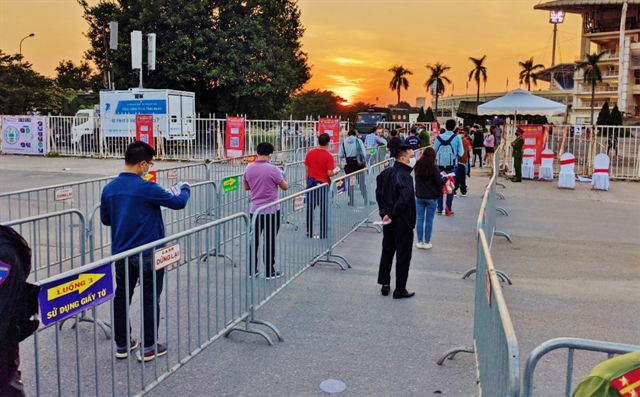 Sports
Sports

There are no moral victories in professional sport, but those of us watching from the sidelines have to take our wins where we can get them.

Peter Cowan
There are no moral victories in professional sport, but those of us watching from the sidelines have to take our wins where we can get them.
While Việt Nam performed admirably against Japan last Thursday night, a 1-0 loss to a much superior opponent is still a loss at the end of the day.
But as for the action that took place off the pitch, I think we can tentatively chalk that up as a win for football authorities and fans.
The more than 11,000 supporters at the venue were the first people to attend a large-scale live sporting event in Việt Nam in half a year, after COVID-19 wiped out the end of the V.League 1 season and all other spectator sports.
Hopefully I’m not counting any chickens before they hatch, but it seems like the return to the stands went off relatively smoothly.
On their way in, all supporters had their tickets, vaccination status and COVID-19 test certificate checked.
Pre-match, I was a little concerned all this (necessary) red tape would lead to massive queues and crowds of people milling around the entrances to Mỹ Đình Stadium, but barring huge demand for on-site quick testing causing crowding and some fans to miss the match, there were few problems.
If anything, the extra steps required to get into the ground made the entrance process much safer.
I remember attending a 2018 AFF Cup match at Mỹ Đình where crowd control measures were severely lacking. As I was trying to get in the ground, a huge crowd gathered around a choke point at one entrance where a young, nervous-looking police officer attempting to check tickets was completely overwhelmed.
Luckily no one was hurt that day, but it was easy to envision a scenario where things went badly wrong, so perhaps stringent anti-virus measures could end up having a positive side effect.
With last Thursday night a success off the pitch and tonight (November 16) against Saudi Arabia hopefully shaping up to be the same, what does that mean for the future of live sporting events in our COVID-riddled world?
For starters, it should hopefully provide health authorities with strong evidence that such events can be held safely even as the virus is spreading in the community. In the short-term, hopefully that means more than 11,000 will be able to attend Việt Nam’s upcoming home matches.
For smaller scale events than national team matches though, the future is less clear.
The requirement to have a recent negative COVID test didn’t seem to put many off showing up to cheer on Việt Nam, but could the same be said of a V.League 1 match?
The fastest quick test I’ve taken still meant spending about two hours in a hospital, while the cost for a test can be up to four times the price of a ticket to a V.League 1 match, two factors which make going to a match a decision that takes a lot more planning than one would like.
Perhaps on-site quick testing, as happened on last Thursday night, is the way forward, but it’s hard to imagine cash-strapped V.League clubs footing the bill for that.
The solution may be scrapping the testing requirement for matches unlikely to be sellouts, and keeping it in place for more in demand matches.
Whatever happens going forward though, last Thursday night’s off-pitch victory was a positive step as we move into the new normal for football. VNS